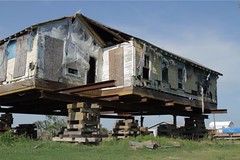
The web refracts the sunrise into a bullseye-shaped rainbow that ripples in a low breeze. Scurrying methodically from one silken vertex to another, the spider dismantles its web like with the comfortable ease of an old outdoorsman striking a tent. The web quivers as tension is redistributed across the steadily decreasing threads. Then, abruptly, the web is gone, reeled into the spider's abdomen—an organic fishing line.
The marshes recede into the blue level of the horizon. They are choked with straw-colored cane grasses and the brown sausages of cattails, populated by cranes and herons. One alligator lies overturned at the roadside, giant mouth open, flies hovering, while the other swims lazily in chocolate water at the marsh's edge. A narrow strip of land runs parallel to the road, pinned between the marsh and the boggy lowlands of the interior. This thin strip is covered with a few abused oaks and weathered trailers, a frail hurricane-break clinging to the edge of the Gulf of Mexico. Many of the trailers are elevated on stilts, some made from welded i-beams and others cobbled together from cinderblocks. The trailers that are not elevated are abandoned, front doors hanging open, thick vines inexorably pulling them into workable pieces as if preparing a meal for digestion. The oaks lean at precarious angles, deformed by endless years of tropical storms. Their scaly gray trunks have deep channels carved into them, garrote scars from power lines wielded by murderous hurricanes. Miles away an oil rig sits on the horizon like a mechanized tick with an insatiable appetite.
Butch is one of the ones who will never leave. He makes this abundantly clear. His trailer was destroyed by hurricane Rita. His trailer was destroyed by hurricane Ike. The storms came within four years of one another after nearly a half-century of relative calm, a fact he attributes to divine judgement. He hopes that people will change their ways and avert another catastrophe, but he would rebuild anyway—home is home. He has never lived anywhere other than this narrow beachhead of civilization at the marsh's edge. His wife is local, too, and she feels the same way. He lists the animals he has seen walking through his twenty acres of waterlogged land: bobcats, foxes, flamingoes. His neighbor recently saw a black panther. After Rita, Butch was evacuated to a city inland and hated every minute of it. The Federal Government didn't want him—or anyone else—to return, it wasn't worth the tax money. From elsewhere in the country, returning appeared to be a suicide mission. If you saw Butch interviewed on the news, you would label him crazy, but if you stood next to him on this waterlogged, windswept patch of nowhere, you would empathize. You might even see the Feds through his eyes: a heartless deus ex machina swooping down to uproot him against his will, the bureaucratic equivalent of a hurricane.
Some of Butch's neighbors didn't return. Others, thinking they would never be allowed back, died from stress, he says. Butch himself jumped through every Federal hoop, filled out every sheet of paperwork, but it was mostly out of politeness. He was moving back, Feds or no Feds. When he says this, the tone of his voice reveals his emotional attachment to the land in a way that words never could. It would take the National Guard to uproot him—the sheriff would never do it because, after all, Butch is the sheriff.


